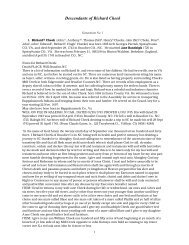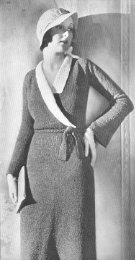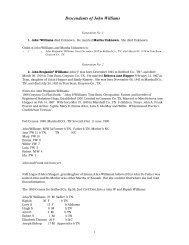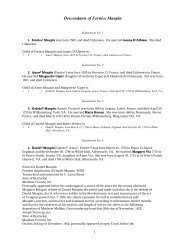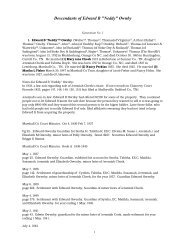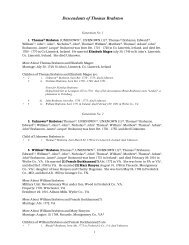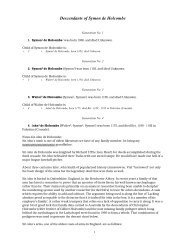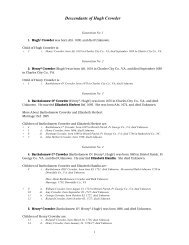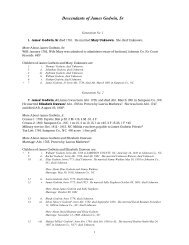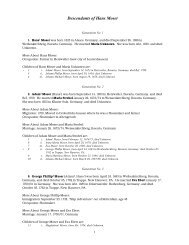Family Tree Maker - Cemetarian
Family Tree Maker - Cemetarian
Family Tree Maker - Cemetarian
Create successful ePaper yourself
Turn your PDF publications into a flip-book with our unique Google optimized e-Paper software.
efore the beginning of Hilary Term 1696, called within the bar, being made king's serjeant, and<br />
knighted Dec 30. He made a speech, March 19, 1699, on behalf of Henry duke of Norfolk, in a<br />
committee of the house of commons, on the second reading of the bill for a divorce between his grace<br />
and the duchess; and opened the indictment, March 28, 1699, on behalf of the king, on the trial of<br />
Edward, earl of Warwick and Holland, for the murder of Richard Coote, Esq; and made a learned<br />
reply to the argument of counsel as to the competency of a witness. [Mr Rayner has a manuscript,<br />
intstuled, "Rules of Practice in the Court of Chancery," with a complete index; and this memorandum<br />
closes it: "N.B. This tract was drawn up for the use of Sir Nathan Wrighte, when he was made lord<br />
keeper".]<br />
He in like manner opened the indictment, Oct 12, 1699, on the trial of Mary Butler, alias Strickland, at<br />
the Old Bailey, for forging a bond of œ40,000, in the name of Robert Clayton; and in the following year,<br />
on the refusal of the lords chief justices Holt and Treby, and Trevor the attorney-general, to accept the<br />
great seal, which was taken from lord Somers, it was delivered by the king in council to Sir Nathan<br />
Wrighte, with the title of lord keeper, May 21, 1700. He would gladly have been executed accepting<br />
that great post for his health's sake, which had been much impaired that spring by a dangerous fever.<br />
Besides, he thought it imprudent to forego the great profits he might make by his practice yearly,<br />
which might have lasted his life, for the precarious enjoyment of the most profitable place; but his<br />
majesty's commands must be obeyed. It was not decent, nor perhaps safe, to disobey them.<br />
He submitted to his pleasure, without any bargain or the least gratuity whatever. He never asked for<br />
any, even the lest, trifle of honour, and though he had not practised much in the court of Chancery till<br />
three or four years before he was appointed to preside over it, yet it soon appeared how equal he was<br />
to the great office, and he executed it with great integrity and judgement, as the records of Parliament<br />
will testify, which can shew as few reversals of his decrees, as of any of his predecessors.<br />
On the contrary, one instance at least occurs of his having reversed a decree of his predecessor lord<br />
Sumers. In 1700, on the death of the duke of Gloucester, the following lines were addressed to him in<br />
the condoleances from the University of Oxford.<br />
"Ad Honoratissium Dom. Nath Wrihte, Magni Sigilli ustodem<br />
"O cui commisit geminas Astraea bilances,<br />
Qui regis infani jurgia rauca fori;<br />
O qui sperabas frustra, precepta tenello<br />
Vel dare Gloverno, vel data jussas, sequi;<br />
Ah cave ne pueri gaudentes funere Gracchi<br />
Sacrilega temerent pendula fccptra manu;<br />
Ah cave sincerum ne Tybris pollast alveum,<br />
Ne I emana fracas squallida soedet a quas;<br />
Aeternas memorum leges defende Britannum,<br />
Sis Themidi, Custos fit Tibi sancta Themis.<br />
Ad. Langley, A.M. Aedis Christi Alumnus"<br />
Sir Nathan was one of the lords justices on the king's going to Holland in 1700, and became also<br />
officially one of the lords commissioners for trade and plantations.<br />
On the day king William died, March 8 1701-2, he delivered the great seal into the hands of queen<br />
Anne, then fitting in council, who instantly returned it.<br />
The Dutchess of of Marlborough, in the "Account of her Conduct," p. 124, says, "As soon as queen<br />
Anne was seated on the throne, the Tories (whom the usually called by the agreeable name of the<br />
Church party) became the distinguished objects of the royal favour. Dr Sharpe, archbishop of York,<br />
was pitched upon by herself to preach her coronation sermon, and to be her chief counsellor in churchmatters;<br />
and her privy council was filled with Tories. My lord Znormanby (soon after duke of<br />
Buckingham), the earls of Jersey and Nottingham, Sir Edward Seymour, with many others of the highfliers,<br />
were brought into place; Sir Nathan Wrighte was continued in Possession of the great seal of<br />
20



